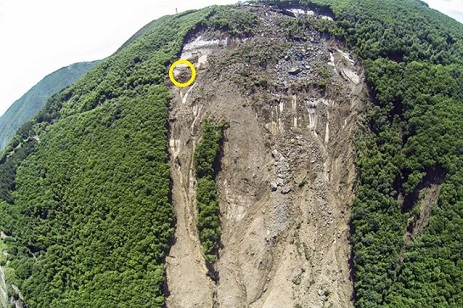Akhaldaba landslide isolates settlement again

A landslide struck just outside Georgia’s capital Tbilisi this morning in an area deemed extremely unsafe following the June 13 landslide and subsequent flash flood.
In the early hours of this morning about 200 cubic metres of land came crashing down onto Tskneti-Betania road near Akhaldaba village, which lies about 10 kilometres above Georgia’s capital city Tbilisi.
No one was injured in the landslide and no houses were damaged, however a previously restored pipeline that supplied Akhaldaba village was damaged, so now the village did not have access to gas, said Georgia’s Ministry of Environment in a special statement.
The statement read: "Today before sunrise the body of the big landslide became active 200m to the east from the heart of the [June 13] landslide”.
Geologists from the National Environmental Agency, patrol police, staff from the Emergency Management department from the Ministry of Internal Affairs and the Infrastructure Ministry were called to the site to monitor the developments.
Speaking from the area a geologist said around 200 cubic metres of mass had fallen in the landslide, which had blocked the Tskneti-Betania road.
"We went to the site after the incident to assess the situation, observe it and make a decision on what to do next.”
Workers spent today clearing debris from the blocked road. The Environment Ministry said the road was "completely blocked” and traffic movement was restricted "but this is necessary for safety reasons”. Vehicle restrictions are expected to be in place for the near future while infrastructure agencies develop an alternative transport route.
Looking ahead there was still a risk of future landslides, said the Environment Ministry.
"[Future] landslides are expected to intensify and given the fact that high-voltage power lines pass on this territory, movement on the road is not safe. Currently we are searching for alternative ways to connect Akhaldaba village with Betania.”
About 180 people live in Akhaldaba and they all rely on nearby Tskineti for basic food and supplies.
This morning’s landslide was much smaller than the one that caused last month’s disaster, in which about a million cubic metres of solid mass came down in the landslide on the Tskneti-Betania road, which created a flow of debris and temporarily blocked the Vere River valley before gushing down the river and into central Tbilisi.
That landslide also blocked the road that connected Georgia’s capital to nearby summer resort areas Tskneti, Betania, Manglisi, Pantiani and other villages.
World-leading specialist in environmental hazards and risk management, Italian geologist Claudio Margottini, inspected the territory after the initial landslide and noted the situation was "rather difficult” and future landslides could be repeated if heavy rainfall began again.
Read the blog from our editor-in-chief about how she spent the June 13 night in Akhaldaba settlement here.
 Tweet
Tweet  Share
Share